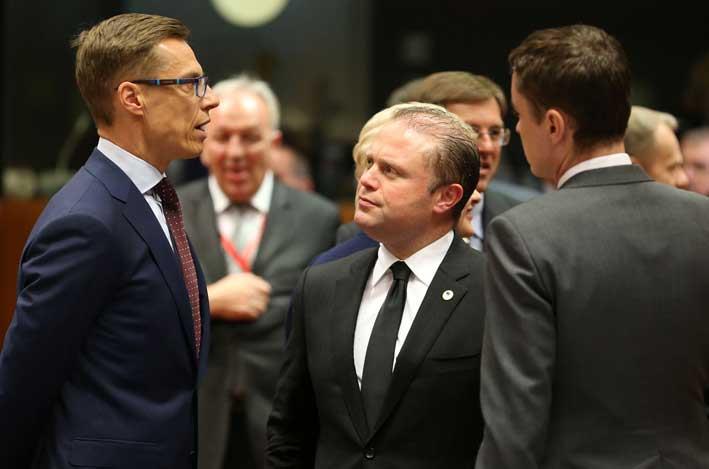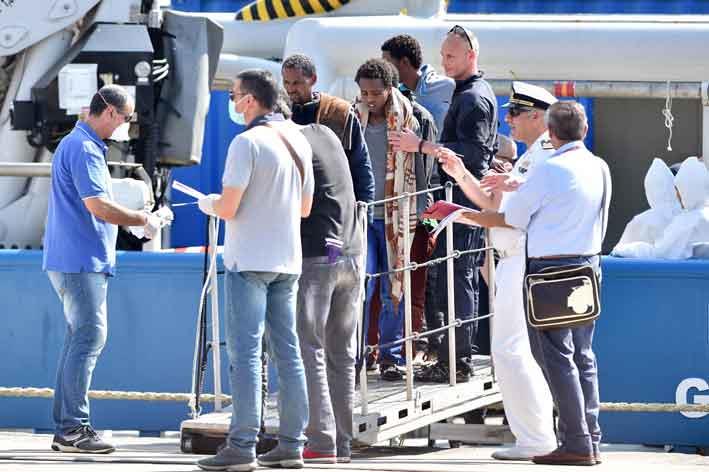Structured border zones and facilities to deal with incoming migrants are likely to be set up in frontline states (which would most likely include Italy and Greece, possibly Malta) to deal with migrants in a swift manner.
These leaked draft conclusions for the upcoming European Council Heads of State Summit that will take place this Thursday and Friday were seen by this newsroom. The draft conclusions were prepared by the President of the European Council, in close cooperation with the member of the European Council representing the Member State holding the six-monthly Presidency of the Council and with the President of the Commission. These conclusions are subject to change should there not be agreement at the Summit where the Council is planned to discuss these topics.
The aforementioned border zones and facilities would occur with active support from Member States' experts and of EASO, Frontex and Europol “to ensure the swift identification, registration and fingerprinting of migrants”.

The migrant situation has been heating up as of late, with more Northern EU countries beginning to feel the impact. Yesterday, the Eurotunnel between the UK and France saw a suspension of services following a port workers’ strike, and migrants began boarding lorries and trailers trying to cross. International news media says that there have been serious threats of intimidation and violence against the drivers.
Following proposals by the European Commission for the Summit, Frontex, the EU border agency, is touted to be granted new powers to initiate and carry out forced deportations. This could be seen as an effort to reduce the number of migrants who do not fall under the requirements needed to receive protection, from crossing the Mediterranean.
“Effective return, readmission and reintegration policies for those not qualifying for protection are an essential part of combating illegal migration and will help discourage people from risking their lives. All tools shall be mobilised to promote readmission of illegal migrants to countries of origin and transit,” the draft conclusions read.
Cooperation with countries of origin and transit will also be a priority, according to the draft conclusions. This will be done through tackling the root causes of migration as well as “stemming the flows of illegal migrants”.
“Development assistance will play an important role in this respect”

The Commission has also indicated its intention to strengthen the "safe country of origin" provisions in the Asylum Procedures Directive, including the possible establishment of a common EU list of safe countries of origin.
“Adequate means will rapidly be made available in support of an effective EU return policy; furthermore, the Commission is invited to make proposals in this respect in the context of the 2016 EU budget”.
Help for Greece and Italy
Heads of state plan to agree to offer Greece and Italy relief, by taking 40,000 asylum seekers “in clear need of temporary protection” over a two-year-period, dividing them out between themselves. “The rapid adoption by the Council of a decision setting up a temporary and exceptional mechanism to this effect; to that end, all Member States will agree by the end of July on the distribution of such persons”
European countries have been divided as to whether the division of migrants would be on a mandatory or voluntary basis, and thus this will probably be a hot topic during the Summit.
The Commission has also adopted a recommendation asking member states - including Greece and Italy - to resettle 20,000 people from outside the EU, in clear need of international protection from outside of the EU over the next two years. This is also likely to be accepted by the Council, however it is also unclear whether this would be on a voluntary or mandatory basis.

Member States also plan to fully implement the Returns Directive, “making full use of all measures it provides to ensure the swift return of illegal migrants; return decisions issued by the Member States will be introduced in the Schengen Information System”.
“In order to accelerate the treatment of asylum claims, the Commission will set out by July 2015, measures to be taken to use EASO to bring together the implementation of the ‘safe country of origin’ provisions in the Asylum Procedures Directive,” the draft conclusions read.
The Valletta Conference
The Valletta conference, that will see European and African leaders meet, is also mentioned. It will seek to achieve assistance to partner countries in their fight against smugglers, a strengthened cooperation on an effective returns policy and better targeting of development cooperation and enhancing investments in Africa “to address the root causes of migration, as well as providing economic and social opportunities”.

As for security, the draft conclusions indicate that member states will agree to allocate “a sufficient level of expenditure for defence”.
“The EU budget to ensure appropriate funding for the preparatory action on Common Security and Defence Policy-related research, paving the way for a possible future defence research and technology programme”.
The draft seems to encompass the fight against irregular migration in all aspects, by speeding up the identification of migrants, thereby resulting in quicker decisions as to whether to deport or grant asylum and pushes for cooperation with countries of origin. This, in addition to the naval mission in the Mediterranean launched earlier this week, to help in the fight against human smugglers.
Campaign Director at Avaaz Alice Jay, in reaction to the draft, said that “The Mediterranean graveyard is Europe’s shame. While this leak shows the EU is prepared to throw a lifeline to desperate families, it leaves important questions unanswered. 400,000 citizens are standing with Malta and calling on leaders from the UK, France, Spain and Eastern Europe to stop haggling over numbers and let down the drawbridge on fortress Europe. Every day of delay will see growing threats to freedom of movement in Europe, and more tragic drownings on Mediterranean shores”.
The UNHCR did not want to comment at this stage, preferring to wait until the final conclusions that will be released following the Summit. In their comments made a few months ago, the UNHCR said that the "engagement with third countries will need to go beyond financing programmes and strengthening law enforcement capacity. Efforts still need to be made to address the root causes pushing people to flee, and to support Governments in truly protecting refugees and others more effectively, ensuring full respect for human rights". Some of their prior proposals include the need to enhance reception facilities and establish additional facilities with access to urgent care and assistance; and urged commercial ships to undertake rescues where required. Their proposals can be found here.